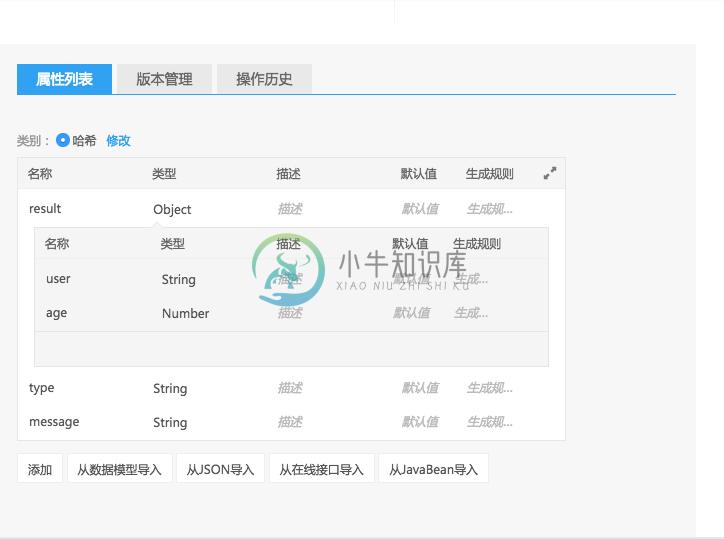NEI 平台系统批量导入 HTTP 接口及格式说明
NEI平台目前支持Swagger和NEI自定义的开放标准来批量导入接口。
Swagger格式导入
Swagger格式目前支持yaml格式的文件导入。 暂时还不(马上就要)支持json格式的Swagger接口导入。 在导入Swagger接口前, 如果不是类似于Swagger服务自动生成而是自己手写(或修改)的, 请先到Swagger editor中检查该规范,确保没有错误。
NEI自定义标准批量导入接口
如果你的项目并不是使用swagger这类标准来定义接口, 此时要批量导入接口和数据类型定义,除了转换为Swagger标准(如果你熟悉它的话),你也可以直接生成我们NEI的数据格式来实现该功能。下面将详细介绍该格式。
说明:
- 下文所有的忽略该字段表示, 你可以不要这个字段,系统已经帮你设置好默认值
格式
最外层数据
{
"datatypes": Array<NEIDatatype>,
"interfaces": Array<NEIInterface>
}
这里以及下文均使用了TypeScript定义, 即":"的右边是该值的类型定义。比如说上面的"datatypes", 他是一个NEIDatatype类型的数组, interfaces是一个NEIInterface类型的数组
你最终是要导出一个类似这样的json。 下面对各个类进行定义。
NEIDatatype
export class Datatype{
name: string;
description: string;
format: DatatypeFormatEnum;
params: Array<Parameter>;
tag: string;
type: DatatypeTypeEnum;
id?: number;
}
这里对每一项进行说明,
| 属性 | 含义 |
|---|---|
| name | 该数据类型的名称,当为空的时候, 为匿名类型。 详细请看匿名类型 |
| description | 该数据类型的介绍 |
| format | 枚举值,参看 DatatypeFormatEnum |
| params | 即该数据模型包含的所有参数数组,每一项的详细定义为Parameter |
| tag | 该数据模型的分组(目前未实现该功能,暂且忽略该字段) |
| type | 枚举值,参看 DatatypeTypeEnum |
| id | 可选值,在创建匿名类型时候需要,其他情况下忽略该字段 |
DatatypeTypeEnum
该值是对数据类型分类的定义,在NEI中,数据模型分为系统预置的系统类型、用户创建的数据类型以及 匿名类型。 所有值如下:
| 值 | 含义 |
|---|---|
| 0 | 用户创建的数据类型 |
| 1 | 系统类型 |
| 2 | 匿名类型 |
所以在一般情况下,你设为0即可
Parameter
类型定义如下:
export class Parameter {
name: string = "";
description: string="";
datatypeName?: string;
defaultValue?: string;
genExpression?: string; // 预留
isArray: boolean = false;
required: boolean = true;
type?: number;
typeName: string;
}
| 属性 | 含义 |
|---|---|
| name | 该数据参数的名称,可以为空 |
| description | 该数据类型的介绍, 可以用空 |
| datatypeName | 导入类型的数据模型名字,详细看 导入类型 |
| defaultValue | 该参数的默认值,请转换为字符串 |
| genExpression | 该参数的生成方法,用于生成mock数据,可以忽略 |
| isArray | 表明该参数是不是一个数组 |
| required | 表明该参数是否必须 |
| type | 该值只在创建匿名类型的时候需要,为匿名类型的id,即上面的NEIDatetype.id |
| typeName | 该值的类型定义,比如系统类型"string", "number", "boolean", 以及本json创建的所有NEIDatatype.name |
这里需要注意typeName的时候,typeName实现了复用数据类型的作用,你可以创建一堆数据模型,然后在文中引用这个数据类型的name。数据模型直接的依赖顺序不需要考虑,即A写在B前面,A也能应用B。
DatatypeFormatEnum
该值是对数据类型自身类型的定义,在NEI上,对于一个数据模型来说,他有Hash、 Enum、File等类型。 所有值如下:
| 值 | 含义 |
|---|---|
| 0 | 映射 |
| 1 | 枚举 |
| 2 | 数组 |
| 3 | 字符 |
| 4 | 数值 |
| 5 | 布尔 |
| 6 | 文件 |
NEIInterface
其定义如下:
export class NEIInterfaceBean {
name: string;
className: string;
description: string;
method: string;
tags: string;
params: NeiInterfaceParams;
path: string;
}
下面对各个属性进行介绍
| 属性 | 含义 |
|---|---|
| name | 该接口的名称,不能为空 |
| description | 该接口的介绍, 不能为空 |
| method | 枚举值,参看 InterfaceMethodEnum |
| tags | 接口分组,目前未实现该功能 |
| params | 接口的参数,详看NeiInterfaceParams |
| path | 该接口访问路径 |
| className | 该接口的代码映射 |
InterfaceMethodEnum
即HTTP方法,String类型,其取值为下(必须为大写):
- GET
- POST
- HEAD
- PATCH
- PUT
- DELETE
NeiInterfaceParams
其定义如下:
export class NeiInterfaceParams{ inputs: Array = []; outputs: Array = []; }
| 属性 | 含义 |
|---|---|
| inputs | 该接口的请求参数, 其定义参看 Parameter |
| outputs | 该接口的响应参数, 其定义参看 Parameter |
匿名类型
匿名类型是当你不想为一个嵌套的hash map创建一个单独的数据类型而设的。 在NEI平台上,表现形式为将一个参数设置为Object类型,此时你就能继续定义这个Object的键值了。如下图所示:  在导入文件格式中,使用了一个比较tricky的方法。你需要为这个NEIDatatype设置一个小于0的id,同时将它的name设为""(空字符串), type字段设为2。 之后在每一个应用该数据模型的地方设置type为该小于0的id值。截图中对应的生成json如下,需要注意的是,第一个匿名类型的id设为-1,使用该匿名类型的result的type设为该id, 即-1。
在导入文件格式中,使用了一个比较tricky的方法。你需要为这个NEIDatatype设置一个小于0的id,同时将它的name设为""(空字符串), type字段设为2。 之后在每一个应用该数据模型的地方设置type为该小于0的id值。截图中对应的生成json如下,需要注意的是,第一个匿名类型的id设为-1,使用该匿名类型的result的type设为该id, 即-1。
{
"datatypes": [
{
"type": 2,
"format": 0,
"name": "",
"id": -1,
"params": [{
"isArray": false,
"name": "user",
"required": true,
"description": "",
"typeName": "string",
"type": 10001
},{
"isArray": false,
"name": "age",
"required": true,
"description": "The type of copyright: C = the copyright, P = the sound recording (performance) copyright.",
"typeName": "integer",
"type": 10002
}
]
},{
"type": 2,
"format": 0,
"name": "",
"params": [ {
"isArray": false,
"name": "result",
"required": true,
"description": "The copyright text for this album.",
"type": -1 // !import
},{
"isArray": false,
"name": "type",
"required": true,
"description": "",
"typeName": "string",
"type": 10001
},{
"isArray": false,
"name": "message",
"required": true,
"description": "",
"typeName": "string",
"type": 10001
}]
}]
}
导入类型
NEI上可以实现导入类型。我们需要对每一个 param 加上 datatypeName, 这样就能够将这些参数归类在一起。 详细看样例。
详细的样例请看importExample。 如果你也是使用TypeScript, 你可以使用这个定义文件,方便获取上诉定义(依赖Swagger Parser NPM包)

